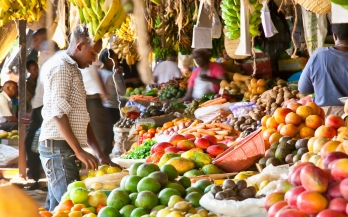Most people, including low-income households in developing countries, buy their food from markets, both formal and informal. Therefore, it makes sense to treat them as consumers. At GAIN, our aim is to enable these consumers to improve their diets through increasing consumption of nutritious and safe foods, because a good diet is central to tackling all forms of malnutrition.
Every year UNICEF issues an authoritative review called the “State of the World’s Children”. GAIN is proud to have worked closely with UNICEF on its 2019 report issued in London yesterday. The focus of this year’s report is on nutrition and diets. The State of the World’s Children last addressed malnutrition 20 years ago, and much has changed since then.
In October, over 80 cities came together in Montpellier, France to review implementation of the Milan Urban Food Policy Pact (MUFPP). An increasing number of cities are signing the Pact (it has currently over 200 signatory cities), with 25 signing during the meeting.
Poor nutrition is an untrenched global challenge that impacts many of the 17 UN Sustainable Development Goals. Solving it will require a significant capital infusion in a more local, more sustainable, global food system able to deliver more affordable healthy food. That’s a big opportunity for impact investors.
I just completed a trio of meetings in Asia (TICAD), Africa (AGRF) and North America (UN General Assembly) all of which had a strong set of dialogues around food systems, asking how they need to be rebuilt to promote human health, rural livelihoods and planetary health.
This week is World Breastfeeding Week, honouring one of the most effective and cost-effective nutrition interventions around: human breastmilk contains all the nutrients needed for young infants, conveying health benefits for both babies and mothers.
Last week GAIN awarded the outgoing Director General of the Food and Agriculture Organization (FAO), Dr Graziano Da Silva, the 2019 Nutrition Inspiration Award. When looking back at Dr Da Silva’s tenure at FAO it is surprising at how revolutionary it has been. Unlike some others in our field, Dr Graziano has grasped that the world of hunger and nutrition is rapidly changing and he has equipped FAO to address those challenges.
Last week, GAIN co-led a five-day Executive Short Course entitled "Together for Nutrition: Public-Private engagement to improve the consumption of nutritious food". The course, the first of its kind, was made available by the six funders who together support GAIN’s Making Markets Work for Nutritious Foods programme.
What makes a great footballer? Presumably, training, determination… and muscle. Building muscle requires consuming large amounts of protein and energy, and eating meat is a highly efficient way of doing this. For the rest of us who are not athletes, however, it is less challenging to consume enough protein and energy in a standard portion size of food, and hundreds of millions of adults live a happy and healthy life without consuming any meat.
Recently GAIN and the Accesss to Nutrition Foundation (ATNF) co-hosted a meeting on "Building Business Commitments for the 2020 Nutrition for Growth Summit" in The Hague. There were 140 participants, with over 60 representatives from the business community. The host was the Government of the Netherlands and the meeting was opened by the Government of Japan, which will host next year’s Global Nutrition Summit.










